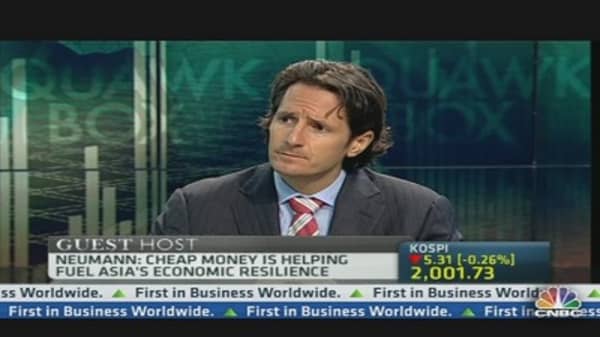As Asian economies shift into recovery mode, inflation appears to be low on the priority list of central bankers, but HSBC's Asia economist warns against such complacency, as he expects a resurgence in price pressures this year, fueled by wage growth.
The Philippine central bank said on Tuesday it expects inflation to remain benign in 2013 and that its monetary policy stance of low interest rates remains appropriate. Indonesia's central bank, which kept interest rates at a record low of 5.75 percent last week, says inflation is manageable, while South Korea has just lowered its expectations for inflation and is tipped to lower rates again.
(Read More: Bank of Korea Holds Rates, Hints at Cut to Come)
"Everyone thinks inflation is not an issue right now, but it is going to make a come-back and while in the past inflation has been all about food and energy, this time it's going to be about wages and that's a much more pernicious threat," Frederic Neumann, the co-head of Asian economic research at HSBC told CNBC Asia's "Squawk Box" on Tuesday.
He said he expected wage pressures to be most significant in Thailand, Indonesia, Singapore and Hong Kong.
"Central bank easing will not be there forever because inflation is coming back and I think it will come back sooner in emerging markets than people currently expect," Neumann added.
He expects Indonesia, Thailand and South Korea to be the first to hike interest rates in Asia, which is likely to lead a tightening cycle.
Independent economist Andy Xie told CNBC earlier this month that he believes
India
and Southeast Asia are most vulnerable to inflation risks, forecasting that inflation in India could rise to 10 percent and above 5 percent in Southeast Asia.
(Read More: Watch Out, Asia. Inflation Is Coming)
A rise in the minimum wage in parts of Southeast may fuel wage increases, analysts say. Thailand has just raised its daily minimum wage to almost $10, while Indonesia, Southeast Asia's biggest economy, is expected to implement a double-digit wage hike this year. Following protests late last year, Jakarta, Indonesia's capital city, agreed to raise its monthly minimum wage for 2013 by 44 percent to $230, a move that follows hikes in other parts of the country.
Robert Prior-Wandesforde, director for non-Japan Asia economics at Credit Suisse in Singapore, says that while he does not believe inflation is the key issue for Asian economies this year, Indonesia is the country he would single out in terms of heightened inflation risks.
"The one we're most concerned about is Indonesia, partly because of the wage issue and partly because of the weaker rupiah and general signs of overheating," he said, referring to the Indonesian currency, which has fallen about four percent in the past six months.





